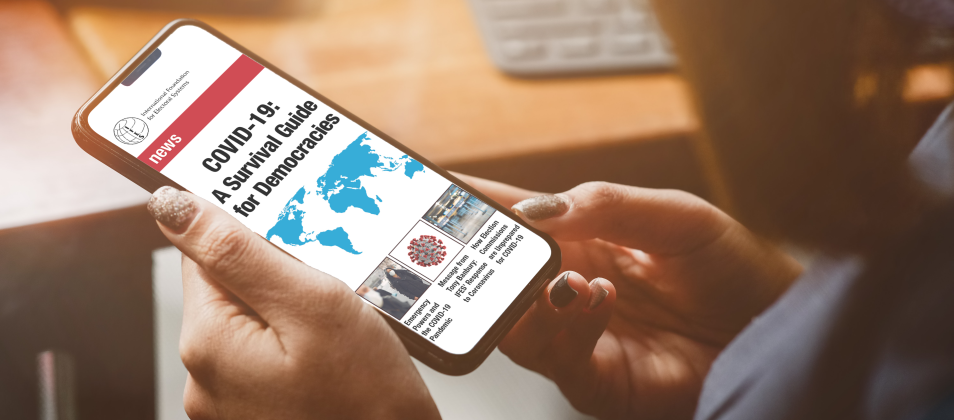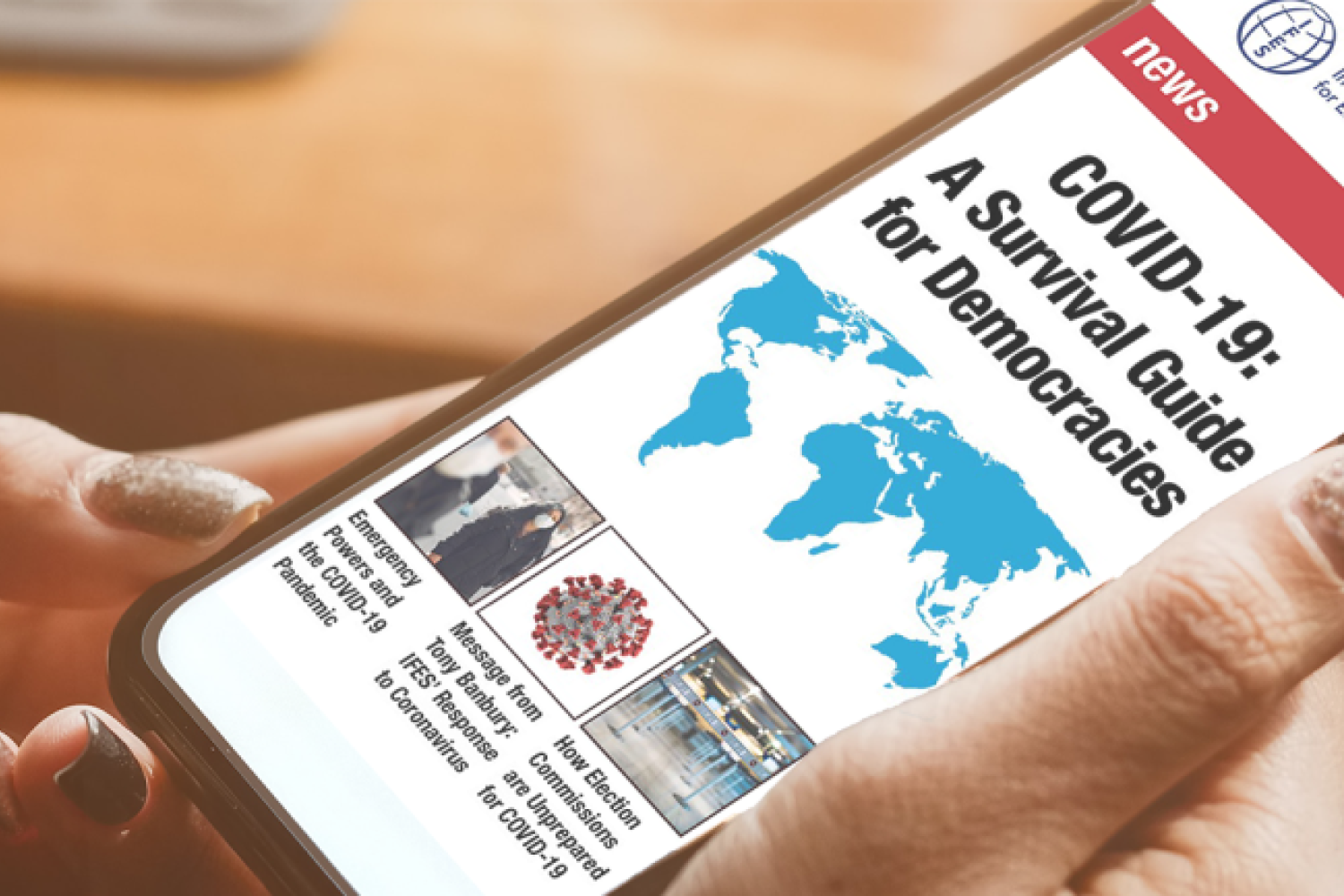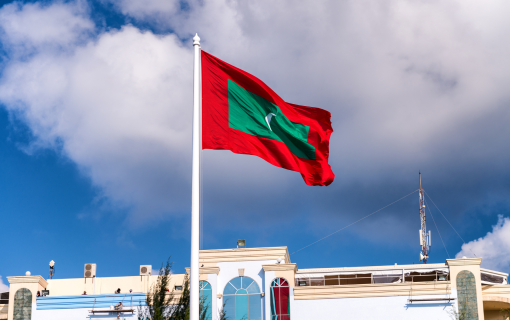
The Legal Quagmire of Postponing or Modifying Elections
by Katherine Ellena
Globally, many electoral activities planned for the near future will be – or already are – affected one way or another by the COVID-19 pandemic. The International Foundation for Electoral Systems (IFES) is tracking these developments closely; the primary response of many countries has been to postpone elections, sometimes indefinitely.
At the time of writing, elections in 47 countries are postponed, which represents nearly a quarter of the countries in the world.
At the time of writing, elections in 47 countries are postponed, which represents nearly a quarter of the countries in the world. Countries are also grappling with how to modify election procedures to minimize the risk for COVID-19 transmission, or change the system for voting completely to avoid the need for voters to physically go to the polls.
These decisions are important and often necessary. However, they are far from simple. Because periodic elections are a fundamental right1 and are crucial to facilitating peaceful and democratic transfers of power, deadlines for holding these elections are often baked into a country’s legal or constitutional framework. For example, in the United States legislation requires the election to take place on the first Tuesday after the first Monday in November,2 while the Constitution requires Congress to be sworn in on January 3 and the president on January 20.3
Deadlines for holding elections are often baked into a country's legal or constitutional framework.
Occasionally, the constitutional or legal framework may provide for continuity of government beyond a mandated term, but in many other cases it is silent. For example, the Constitution in Myanmar explicitly provides that “after the expiry of the incumbent term, the President and the Vice-Presidents (who are elected indirectly) shall continue their duties until the time the new President is duly elected,”4 but no similar provision exists for members of Parliament. Hence, if elections are postponed beyond the end of a legally mandated term of office, questions may arise as to the legitimacy of office holders, even if a state of emergency is in place.
At the same time, international law allows for the derogation of some rights – including the right to vote and stand for election – in emergency situations, albeit with very strict guardrails to prevent abuse. Countries sometimes have clauses in their Constitutions or electoral legal frameworks allowing for the postponement of elections due to emergency situations. Many countries have already relied on such clauses to postpone elections or referendums due to COVID-19: for example, Chile, France, Serbia, Sri Lanka and the United Kingdom.
Where emergency measures conflict with constitutional deadlines for elections, this can result in pressure to move ahead with an election, or to risk a real or perceived constitutional crisis.
The responsibility for making these difficult legal and operational decisions regarding the postponement or modification of elections varies between countries and can become fraught, especially where the legal basis for postponement is not clear cut. In some countries the election management body is mandated with setting the date of the election within the bounds of constitutional deadlines (for example, Ethiopia); in some, it rests with the executive (New Zealand); and in others, it is set in law (the United States). Wherever the decision-making authority rests, careful consultation is required to examine the issues at stake and the options on the table. If both electoral deadlines and emergency powers are provided for in the Constitution without any specific guidance on how they interact, additional constitutional interpretation will likely be needed by the courts or whichever body has the authority to determine constitutional questions.
The responsibility for making these difficult legal and operational decisions regarding the postponement or modification of elections varies between countries and can become fraught.
Beyond the postponement of elections, many countries are considering modifications to how elections are conducted, including – but not limited to – introducing or expanding postal voting. Discussions around internet voting have also a gained momentum. As IFES notes in Guidelines and Recommendations for Electoral Activities During the COVID-19 Pandemic, “it is essential that election management bodies (EMBs) and public authorities around the world make sensible and well-informed decisions … [that are] informed by health authorities and might vary depending on each country’s public health capabilities, level of spread of the disease, and other contextual factors.”
At the same time, careful consideration must be given to the electoral legal framework underpinning elections. In many cases election laws set out specific election processes – and sometimes specific timelines – and will require amendment to allow for any operational modification. This is true not only for polling but may also impact other parts of the process such as voter registration, campaigning and counting.
Where these details are set out in the administrative regulatory framework, it will be easier for a EMB to make changes quickly, but this does not obviate the need for careful consideration and consultation – including as to whether some changes require a sunset clause or would actually be beneficial to maintain for the longer term. For example, measures to avoid crowded in-person polling stations, such as extending advance voting, curbside voting and mail-in ballots, would allow easier access for people with disabilities and older citizens in all elections.
Legal Elements to Consider in Relation to Election Postponements and Modifications
- Source of authority for setting or moving election dates
- Legal or constitutionally mandated deadlines for transfers of power
- Provisions for continuity of power beyond the end of a term, or for caretaker governments
- Legal or constitutional authority for temporary derogation of rights or postponement of elections in emergency situations
- Laws or regulations enabling flexibility or modification of methods or modes of carrying out election processes
- Set timelines in the legal framework for key electoral processes such as voter registration, candidate registration and campaigning
- Statutory authority for EMB to develop regulations and procedures
- Provisions in the legal or regulatory framework requiring certain forms of accessibility, inclusion or consultation
A crucial consideration for modifying election processes in the law is the need to preserve legal certainty. Elections are by nature rules-based exercises, and changing the rules too close to the game, or without regard to flow-on effects, can be damaging. The Venice Commission’s Code of Good Practice in Electoral Matters affirms that “stability of the law is crucial to credibility of the electoral process” and recommends no legal changes in the year prior to an election. Unfortunately, some countries may not have the luxury of time in responding to COVID-19 while preserving elections. In which case, drastic changes should be limited, and the requirement for clear communication, increased training and effective procedures will be even greater.
It is inevitable in some contexts that decisions to postpone or modify elections will become politicized and heavily contested. Partisan actors are likely to challenge these decisions in the courts, with varying motivations. The U.S. Supreme Court has already been asked to weigh in on such a dispute in RNC v. DNC (U.S., April 6, 2020), where it controversially limited itself to what it called a “narrow technical question” of whether to allow absentee ballots mailed and postmarked after Election Day to be counted.
Unfortunately, there is no clear body of law to guide judicial decision-making and support reasonable and fair remedies that protect both democracy and public health. For example, should there be different types of scrutiny for different types of elections? What are the elements that could or should inform the decision-making process: for example, poll worker safety, constitutional deadlines or the availability of alternative voting processes? And, what types of remedies are or should be available to the courts with respect to election postponements or modifications? These are questions without a clear answer – yet.
Katherine Ellena is IFES' senior global legal advisor.
1 International Covenant on Civil and Political Rights, Article 25(b)
2 Statutes at Large, 28th Congress, 2nd Session, p 721
3 Constitution of the United States of America, Article XX (Amendment 20)
4 Constitution of Myanmar 2008, Article 61(b)













